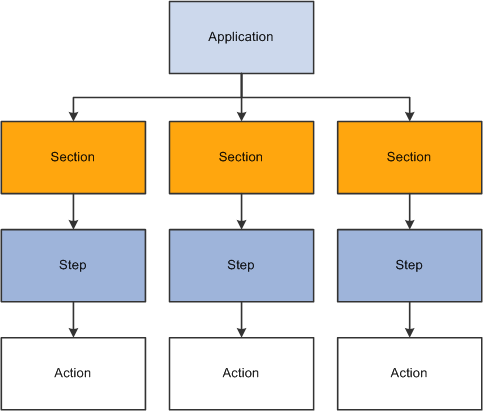 Application Engine Overview
Application Engine Overview
This chapter provides an overview of Application Engine and discusses:
Application Engine implementation
Other sources of information
 Application Engine Overview
Application Engine Overview
Application Engine is a PeopleTool designed to help you develop background SQL processing programs. This tool is intended to be used by developers with knowledge of SQL, SQL tools, and PeopleTools.
Application Engine offers you an alternative to writing COBOL or SQR programs for background SQL processing. While Application Engine does not generate, parse, or understand SQL, it does execute SQL that you provide.
This diagram shows the program structure of Application Engine:

Application Engine Program Structure
 Application Engine Implementation
Application Engine Implementation
This section provides information to consider before you begin to use Application Engine.
Implementation of Application Engine can be divided into the following activities:
Set up properties.
Specify actions.
Create temporary table instances.
Set up debugging options.
Enable application engine tracing.
To set up Application Engine properties, you perform the following steps:
|
Step |
Reference |
|
1. Set up program properties. |
|
|
2. Set up section properties. |
|
|
3. Set up step properties. |
|
|
4. Set up action properties. |
To modify the action properties, you perform the following steps:
|
Step |
Reference |
|
1. Specify SQL actions. |
|
|
2. Specify Do actions. |
|
|
3. Specify PeopleCode actions. |
|
|
4. Specify Call Section actions. |
|
|
5. Specify Log Message actions. |
Creating Temporary Table Instances
To set up temporary tables to improve performance, you perform the following steps:
|
Step |
Reference |
|
1. Define temporary tables. |
|
|
2. Set up the number of temporary table instances. |
|
|
3. Build table instances. |
To set up debugging options for Application Engine programs, you perform the following steps:
|
Step |
Reference |
|
1. Enable the Application Engine debugger. |
|
|
2. Set up debugging options. |
Enabling Application Engine Tracing
To trace Application Engine programs, you perform the following steps:
|
Step |
Reference |
|
1. Set command line options. |
|
|
2. Set parameters in server configuration files. |
|
|
3. Set options in Configuration Manager. |
Other Sources of Information
In addition to implementation considerations presented in this chapter, take advantage of all PeopleSoft sources of information, including the installation guides, release notes, and PeopleBooks.
See Also
Enterprise PeopleTools 8.50 PeopleBook: Getting Started with Enterprise PeopleTools